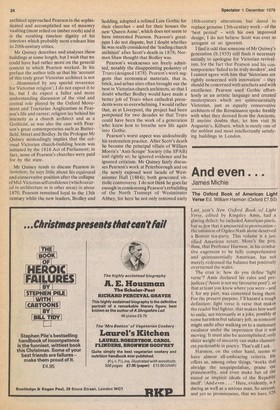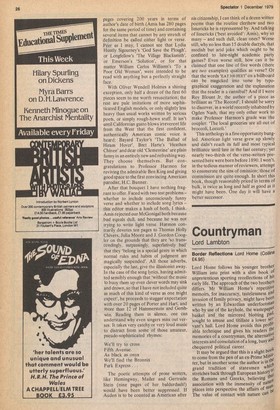And even...
James Michie
The Oxford Book of American Light Verse Ed. William Harmon (Oxford 27.50)
Last year's New Oxford Book of Light Verse, edited by Kingsley Amis, had a glaring defect: he included American poets, but so few that it amounted to provocation — the ontission of Ogden Nash alone deserved a Boston tea-party. This volume is a justified American retort. More's the pity, then, that Professor Harmon, in his combative eagerness to be fully comprehensive and quintessentially American, has not merely redressed the balance but positively overturned the scales, The crux is: how do you define 'light verse'? Amis declared his rules and prejudices ('Anon is not my favourite poet), so that at least you knew where you were — and I, for my part, was contented being there. For the present purpose, I'll hazard a rough definition: light verse is verse that makes the reader feel lighter, that makes him want to smile, not necessarily at a joke, possibly at some harmless but salutary jolt, as someone might smile after walking on to a stational,/ escalator under the impression that it was moving. It must also be accomplished; only sheer weight of sincerity can make clumsiness pardonable in poetry. That's all I ask.
Harmon, on the other hand, seems to have almost all-embracing criteria. He offers us, among other things, 'works that abridge the sesquipedalian, praise the praiseworthy, and even make fun of the stated or implicit ideals of the Republic itself'. 'And even . 'Here, evidently, is daring as well as a serious man. So serious, and yet so promiscuous, that we have 528 pages covering 200 years in terms of author's date of birth (Amis has 280 pages for the same period of time) and containing several items that cannot by any stretch of definition be called either light or verse. Peer as I may, I cannot see that Lydia Huntly Sigourney's 'God Save the Plough', or Longfellow's 'The Village Blacksmith', or Emerson's 'Solution', or for that matter William Carlos Williams's 'To a Poor Old Woman', were intended to be read with anything but a perfectly straight face.
With Oliver Wendell Holmes a shining exception, only half a dozen of the first 60 pieces seem to me worth resuscitation; the rest are pale imitations of more sophisticated English models, or only slightly less heavy than usual works written by serious poets, or simply rough-hewn stuff. It isn't until Californian gusto blows irreverent life from the West that the first confident, authentically American comic voice is heard: Bayard Taylor's 'The Ballad of Hiram Hover', Bret Harte's 'Heathen Chinee' and dear old 'Clementine' are plain funny in an entirely new and refreshing way. They choose themselves. But congratulations to Professor Harmon for reviving the admirable Ben King and giving good space to the first convincing American parodist, H.C. Bunner.
After that bouquet I have nothing fragrant to offer. Faced with two test problems — whether to include unconsciously funny verse and whether to include song lyrics — this editor makes a hash of both, I think. Amis rejected our McGonigal both because bad equals dull, and because he was not trying to write light verse. Harmon contrarily devotes ten pages to Thomas Holly Chivers, Julia Moore and J. Gordon Coogler on the grounds that they are 'so transcendingly, surpassingly, superlatively bad' that they 'belong in a special genre in which normal rules and habits of judgment are magically suspended'. All those adverbs, especially the last, give the illusionist away. In the case of the song lyrics, having admitted sensibly enough that 'without the music to buoy them up even clever words may sink and drown, so that I have not included quite as much of this kind of verse as one might expect', he proceeds to stagger expectation with over 20 pages of Porter and Hart, and more than 12 of Hammerstein and Gershwin. Reading them in silence, one can understand why even singers miss out verses, It takes very catchy or very loud music to distract from some of those amateur, pseudo-sophisticated rhymes: We'll try to cross Fifth Avenue.
As black as onyx We'll find the Bronnix Park Express. .
The poetic attempts of prose writers, like Hemingway, Mailer and Gertrude Stein (nine pages of her balderdash!) would have been better • suppressed. If Auden is to be counted as American after nis citizenship,] can think of a dozen wittier poems than the routine clerihew and two limericks he is represented by. And talking of limericks (test avoided': Amis), why so many — and such dull, clean ones? Worse still, why no less than 15 double dactyls, that modish but arid joke which ought to be confined to late-night academic party games? Even worse still, how can it be claimed that one line of five words (there are two examples) qualifies as verse? Or that the words 'EAT 300 FEET' on a billboard can be magicked into verse by typographical exaggeration and the explanation that the reader is a cannibal? And if I were Roy Blount Jr, the author of a piece as brilliant as 'The Record', I should be sorry to discover, in a world recently inhabited by Ogden Nash, that my only other work to make Professor Harmon's grade was the couplet: 'The local g ocer ies are all out of broccoli, Loccoli.'
This anthology is a fine opportunity bungled. American light verse grew up slowly and didn't reach its full and most typical brilliance until late in the last century; yet nearly two-thirds of the verse-writers presented here were born before 1890. I won 't, in the tedious manner of reviewers, attempt to enumerate the sins of omission; those of commission are quite enough. In short this book, though reasonably priced in terms of bulk, is twice as long and half as good as it might have been. One day it will have a better successor.












































 Previous page
Previous page